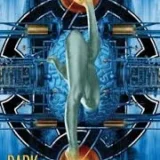Welcome to the second installment of this blog! Every month, I’m looking at a classic SF short story through the lens of some pop culture topic that’s developed since the story was written. The initial inspiration was a late January entry on my personal blog, Matthew Gordon Books, comparing Edward Everett Hale’s 1869 proto-SF story “The Brick Moon” to the International Space Station. Last month, it was a reconsideration of Cyril Kornbluth’s “The Little Black Bag”, a story in which people are divided by intelligence levels, based on Howard Gardner’s theory of multiple intelligences. This month, it’s Lyon Sprague De Camp’s 1937 story “The Isolinguals”, his first published work. My version is the one in the 1963 compendium First Flight, so that’s where my page numbers’ll refer.
A Coordination Game in “The Isolinguals”
June 10, 2016
In “The Isolinguals”, people in and around New York City become possessed by a mysterious force that turns them into updated versions of their possible ancestors. They inherit old memories, speak dead languages, and exhibit exactly the sort of bewildered behavior one might expect from someone so far removed from his or her own mental time period. The main characters are two biologists, Dr. Arthur Lindsley and Dr. Pierre Lamarque, who are tasked with figuring out how this could occur.* They range from an ancient Greek in the oldest example (20) to the isolingual’s own father in the most recent. (17) Their historical knowledge and tendencies, such as Mike Watrous’s acquisition of “a complete biography, personality and accent”, make it evident to the scientists this isn’t a hoax. (13) If someone has multiple ancestries, such as Professor Lamarque’s combined French/Ojibway heritage, which ancestral line the person inherits is chosen at random. (19)
Once they emerge, they understandably seek out people who speak their language – for those who speak anything other than modern English, this is almost exclusively other isolinguals: “A case speaks Anglo-Saxon, say. He wanders around until he runs into somebody else who speaks Anglo-Saxon, and they join up for purposes of offense and defense. Pretty soon, you have a gang.” (20)
These gangs at first appear to resemble early 20th-century street gangs, which often broke down along ethnolinguistic lines. However, it soon becomes apparent that they have no such overarching strategy:
“At the present rate, in another month New England and the Middle Atlantic states would be a wilderness, inhabited solely by roving bands of isolinguals who battled each other with clubs, rocks and the loot of hardware stores.” (22)
In making the isolinguals so much more effective when they seek each other out, De Camp has presaged the coordination game.
One example of a coordination game is a game called Choosing Sides. There are two players, each with two options. If both players take either Option A or Option B, they receive a payoff of X. The payoff is the same for either player in either scenario. If the players choose different options, each receives nothing.
Situating Complexity explains the game further here, with an associated picture here.
In “The Isolinguals”, De Camp makes it clear that the isolinguals are being hunted, and that forming gangs is a way to protect themselves. Lindsley notes that “They’re going to start a concentration camp for new cases”. (15) This is especially chilling in light of “The Isolinguals”‘s publication date two years before the outbreak of World War II. Freedom concerns aside, being an isolingual is terrifying due to the foreignness of the modern world. Burge, who becomes his own father and thus has no need to worry about not understanding the language, wakes up to think he’s been kidnapped. (16)
Isolinguals have their freedom threatened and are confused as to why they are where they are. Many of them lack the ability to communicate with the people they meet, which can be a backdrop for violence. They have no choice but to seek out linguistic peers, basically at random – one can’t expect an ancient Roman to know where anything is in New York City, after all. The payoffs they seek are among the most basic of safety and belongingness needs. They need to find each other in order to keep safe from concentration camps and form communities in their adoptive home. The alternative is they get shot. (24-25)
It is the isolinguals’ abilities to make coordinated decisions that often determines which ones survive.
*I’ve taken great care to avoid spoilers. Let’s just say it’s a deus ex machina that left me about as confused as the average isolingual.









